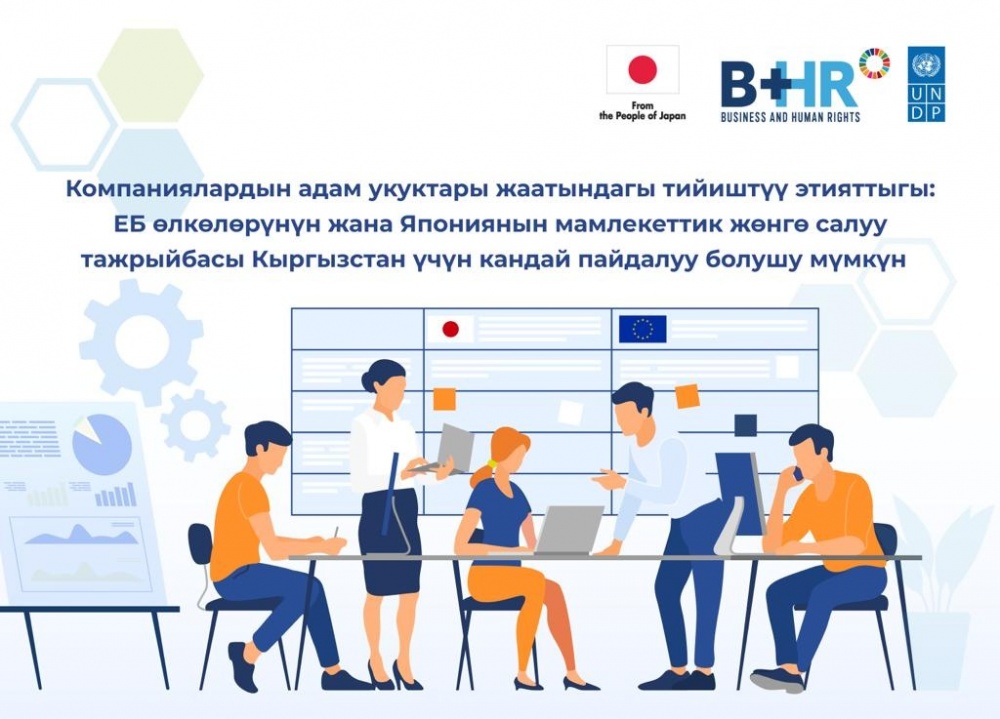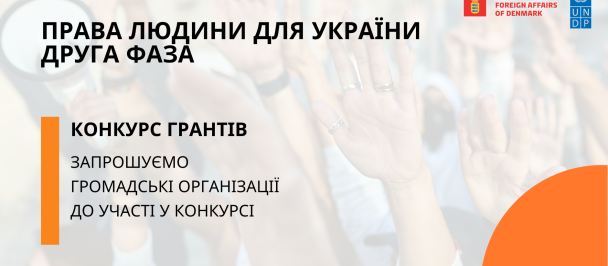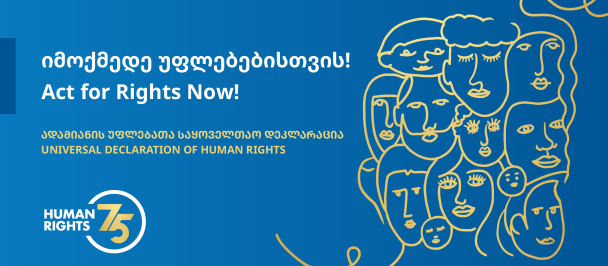Due diligence of companies in the field of human rights: how the experience of state regulations in the EU and Japan can be useful for Kyrgyzstan
January 16, 2024

Companies that seek to develop their business contacts, investment participation, sustainable development, increasingly feel that they are expected to due diligence in the field of human rights. This expectation is formed among investors, business partners, consumers, employees. Increasingly, these expectations are voiced by states, international organizations, business associations, and human rights activists.
In 2011, the UN Guiding Principles on Business and Human Rights were approved by consensus in the UN Human Rights Council. In addition, the obligations of states to protect human rights from the possible adverse effects of companies and the responsibility of companies to respect human rights were included in the Organization for Economic Co-operation and Development (OECD) Guidelines for Multinational Enterprises (the OECD Guidelines for Multinational Enterprises) in 2011. Similar provisions were included to the Tripartite Declaration of Principles on Multinational Enterprises and Social Policy (the ILO Declaration on MNEs) of the International Labor Organization when it was revised in 2017.
Over the past years, this trend has been increasingly intensifying and reinforced by various steps taken by states at the national level. We propose to consider what legislative regulation the EU countries offer to their business entities, what experience Japan can share and which of the models can be used by Kyrgyzstan. In addition, the information we provide may be useful to those companies in Kyrgyzstan that are already cooperating with European or Japanese companies or are planning to cooperate, since this regulation applies not only to the company itself, but also to its entire supply chain.
The France experience
French law imposes an obligation to exercise vigilance/due diligence (devoir de vigilance) on companies registered in France for two consecutive financial years, which either themselves have at least 5,000 employees or in the company itself and subsidiaries in France and abroad employs at least 10,000 people. This is about large companies. However, due diligence requirements extend to their entire supply chain.
Companies affected by the law may develop, disclose and implement a vigilance plan. Plan should cover the human rights risks associated with the company itself, subsidiaries it controls, and suppliers with whom the corporation does business. The plan must include "reasonable vigilance to adequately identify risks and prevent serious human rights violations, risks of serious harm to health, safety and the environment." In other words, while French law is limited to large corporations and their business partners, its coverage is quite broad, including risks not only to human rights, health and safety in the workplace, but also to the environment.
The vigilance plan, which can be developed jointly with relevant stakeholders or through multi-stakeholder initiatives, should include the following five actions:
- mapping, which identifies, analyzes and ranks risks according to their priority;
- procedures for regular assessment of the situation of subsidiaries and suppliers;
- appropriate actions to mitigate risks or prevent serious breaches;
- an alert mechanism that collects reports of existing or actual risks, developed in partnership with trade unions;
- a monitoring scheme to control the implemented measures and evaluate their effectiveness.
This is the due diligence process.
The Netherlands experience
Dutch law aims to combat child labor in business supply chains. The law is very broad in scope and applies to all businesses selling or supplying goods or services to end users in the Netherlands. It is worth noting that the Dutch government recently announced its intention to enact a comprehensive mandatory human rights due diligence law that would cover risks to the entire catalog of human rights, not just child labor issues.
The law requires all businesses covered by the law to adopt and implement a human rights due diligence plan if there is a “reasonable suspicion” that goods or services supplied were produced using child labor.
Sanctions for breaking the law can be significant. The fine for failing to conduct due diligence in the field of human rights can be up to ten percent of the annual turnover of the enterprise. The law also provides for criminal liability: “A director may be imprisoned for up to two years if a fine has been previously imposed in the previous five years for violating the same requirement of the Law, and a new violation is committed by order or under the actual direction of the same director.”
The Switzerland experience
The Swiss law introduces two main obligations.
First, large Swiss corporations (with at least 500 employees and a minimum turnover of 20 million Swiss francs or a minimum turnover of 40 million Swiss francs) must report on "environmental, social and labor issues, as well as human rights and anti-corruption measures"
Second, corporations registered in Switzerland or having their principal place of business in Switzerland are required to carry out human rights due diligence in two situations: (i) if they import or process beyond a certain threshold “minerals or metals in Switzerland containing tin, tantalum, tungsten or gold from conflict-affected and high-risk areas”; (ii) if they sell goods or services in Switzerland with "reasonable grounds for suspecting that they have been produced using child labor".
Thus, the scope of Swiss human rights due diligence legislation is rather narrow: apart from potential situations of child labor, corporations are only required to carry out due diligence if they import or process minerals above a certain level from conflict zones. Violation of these obligations may result in a fine of up to CHF 100,000.
The Norway experience
The Norwegian law aims to "assist enterprises in respecting fundamental human rights and decent working conditions" in relation to the production of goods and the provision of services. It also aims to "ensure the general public has access to information on how businesses address adverse impacts on basic human rights and decent working conditions."
At the same time, the law provides that “decent working conditions” means work that guarantees basic human rights, as well as “health, safety and the environment in the workplace” and “provides a living wage”. By explicitly including a living wage (rather than a minimum wage in the category of decent work), Norwegian legislation imposes higher requirements on enterprises, which is consistent with the public commitments made by some multinational corporations. The subsistence minimum does not mean the official subsistence minimum established by a particular state, but the minimum calculated based on real living conditions necessary to meet a person’s needs to lead a decent lifestyle, including attending cultural events, sport etc.
The law applies to large businesses that are resident in Norway and offer goods and services in or outside Norway, as well as large foreign businesses that offer goods and services in Norway and are required to pay taxes in Norway. Large enterprises are defined as “enterprises that satisfy two of the following three conditions: sales revenue of NOK 70 million, total balance sheet of NOK 35 million and an average number of employees in the reporting year equivalent to 50 positions. It is estimated that the law applies to approximately 8,830 businesses.
Norwegian law requires all eligible businesses to “conduct due diligence in accordance with the OECD Guidelines for Multinational Enterprises”. This is essentially the same due diligence process as provided for in the UN Guiding Principles. However, the human rights due diligence obligation extends to the operations of the enterprise, its supply chains and business partners.
A unique aspect of Norwegian law is the right to information: “any person has the right to be informed by an enterprise about how the enterprise is addressing actual and potential adverse human rights impacts”. The information requested under this provision may be of a general nature or may relate to a specific product or service offered by the business.
This provision provides affected individuals and communities with a potential tool to search for relevant information in a timely manner and, in turn, partially addresses the information asymmetry that exists between businesses and rights holders.
The Germany experience
German law applies to all commercial enterprises that have key place of business, administrative headquarters or registered office in Germany with at least 3,000 employees. This also applies to foreign corporations with a local branch if they have at least 3,000 employees. It is estimated that the law applies to approximately 900 companies from January 1, 2023 and will apply to approximately 4,800 companies from January 1, 2024.
In terms of scope, the law covers risks to internationally recognized human rights, labor rights and the environment.
Businesses covered by the law are required to conduct due diligence in the field of human rights in relation to risks related to internationally recognized human rights and environmental rights. This obligation applies to the enterprises' own activities as well as to the activities of their direct and indirect suppliers. Eligible businesses are expected to conduct human rights due diligence in an “appropriate manner”, which is determined based on the nature and extent of their activities, their ability to influence the behavior of their business partners, the severity of the violation, and the nature of the causal relationship.
German law requires eligible businesses to implement a "proper internal complaints procedure" to allow affected persons to report risks and irregularities related to the business activities of such businesses, as well as their direct suppliers. The law also provides for financial sanctions and administrative fines imposed by the Federal Office of Economic Affairs and Export Control. The German law also provides that businesses that are subject to administrative fines for violating it must be excluded from public procurement for up to three years.
Trade unions and non-governmental organizations are empowered to initiate cases on behalf of affected individuals and communities. It is an important tool for overcoming the power asymmetries between large German corporations and victims of human rights violations in their search for access to legal remedies.
The Japan experience
In September 2022, Japan adopted the Guidance for Companies on Respecting Human Rights in Responsible Supply Chains at the ministerial level. This document has become one of the important steps towards the implementation of Japan's National Action Plan for Business and Human Rights for 2020-2025, which was adopted in October 2020.
The Guidance recognizes that, in accordance with the UN Guiding Principles, businesses operating in Japan should pay attention to the adverse human rights impacts of their own business, other companies in their group, and businesses in their supply chains, both in Japan and abroad.
Based on the UN Guiding Principles, the OECD Guidelines for Multinational Enterprises, the ILO Declaration on MNEs and other international standards, the Guide has been developed to help businesses increase their understanding and stimulate their efforts by explaining the actions that businesses should take to respect human rights, in a specific and in an easy-to-understand manner that corresponds to the actual situation of enterprises doing business in Japan. The Guidelines can be found through the link: https://www.undp.org/ru/kyrgyzstan/publications/rukovodstvo-po-uvazheniyu-prav-cheloveka-v-otvetstvennykh-cepochkakh-postavok
In other words, the Japanese government has taken the path of providing guidance to Japanese businesses on how to implement due diligence both at the enterprise level and in its supply chains, rather than imposing mandatory requirements on enterprises under the threat of sanctions. The next step by the Japanese government was the organization of trainings and other events to raise awareness of companies in the field of human rights.
Concluding our review, we note that in the almost 12 years since the adoption of the UN Guiding Principles, due diligence in the field of human rights has gradually become the generally accepted standard for responsible business. It is a tool used by all players to identify, prevent, mitigate and account for adverse human rights impacts.
Based on existing human rights due diligence practices (including the mandatory due diligence laws, examples of which we have cited in our material), such a lesson can be drawn for Kyrgyzstan.
Public expectations or market mechanisms alone will not be sufficient incentives for businesses to take their responsibility to uphold human rights seriously. Although it may seem paradoxical, the role of states as regulator, observer, enforcer, mediator and facilitator will be critical to support the practical implementation of responsible business conduct. Another thing is that this role does not have to be embodied in legislative requirements (as it is now happening for large European companies and will be reflected in their supply chains), and considering the context of Kyrgyzstan, the Japanese experience looks much more effective at this stage - the state supports and prompts businesses, gives methodological recommendations on how to ensure respect for human rights in their work.
This article is a part of an information campaign to promote human rights issues in the aspect of entrepreneurship in Kyrgyzstan within the framework of the UNDP project "Business and Human Rights" (B + HR), with the financial support of the Government of Japan.
***
The United Nations Development Programme (UNDP) is one of the leading development organizations in Kyrgyzstan. Since 1993, we have been working in various areas, including inclusive development, environmental protection, crisis response, gender equality promotion, and collaborative efforts towards sustainable development goals.
Media Contact: Nurzhan Alymkanova, Communications Specialist, UNDP Nurzhan.alymkanova@undp.org

 Locations
Locations


